100 Perks of Having Cancer: Plus 100 Health Tips for Surviving It (68 page)
Read 100 Perks of Having Cancer: Plus 100 Health Tips for Surviving It Online
Authors: Florence Strang
Tags: #Health; Fitness & Dieting, #Diseases & Physical Ailments, #Internal Medicine, #Oncology, #Cancer, #Medicine & Health Sciences, #Clinical, #Medical Books, #Alternative Medicine, #Medicine

tein, fiber, and healthy fats. Tasty and great to eat “on-the-go,” nuts are an
easy way to ensure that you’re getting everything you need nutritionally.
Most nuts are great by themselves, but you can also go nuts by adding
nuts to your salad or smoothie, blending them into your soup, or adding
ground nuts to your hot or cold cereal in the morning. In many plant-based
recipes, nuts are used to add creaminess and richness. You can even make
cheesecake using cashews in place of the cream cheese.
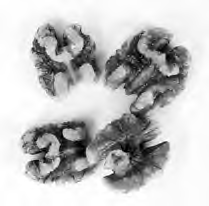
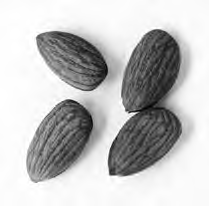
284
100 Perks of Having Cancer
Here is a rundown of the top varieties, their calorie content, and what
makes them so special. I could go on and on about the health benefits (I
am a little nutty about nuts), but these are the highlights.
All the nuts are relatively high in total fat, but the fat contained in nuts
are beneficial to your body instead of settling in your arteries. Still, if
you’re watching your calorie intake, just stick to one or two serving sizes
per day.
Walnuts
Serving size: 14 halves (that’s 7 whole in case you don’t do
numbers)
●
calories: 185
Omega-3: 2.6 grams—the only nut to have high omega-3s, an
extremely important fatty acid for overall health. One serving
of walnuts has as much omega-3 fatty acid as 4 ounces of
canned salmon.
Walnuts are great in muffins and cookies and truly belong in every bowl of
oatmeal on the planet.
Special fact:
The type of omega-3 fatty acid found in walnuts provides
all the benefits that other omega-3s do, but it is high in alpha-linoleic fatty
acids, which has brain-boosting power that can help to prevent dementia
and Alzheimer’s.
Always store your walnuts in the fridge as they can become moldy.
Almonds
Serving size: 23 nuts
●
calories: 163
Almonds are the favorite nuts of dieticians as they are low calo-
rie and high fiber.
Special fact:
Almonds lead the nuts in fiber content, vita-
min E, and calcium. A 1/4 cup serving of almonds has more cal-
cium than 1/2 cup of ice cream (95 versus 85 milligrams), and
it is the only nut that you can sliver. (Go ahead and try slivering a pine
nut . . . I dare you.)
Due to a past salmonella scare, almonds sold commercially in the United
States are processed by pasteurization, even if they say “raw” on the bag.
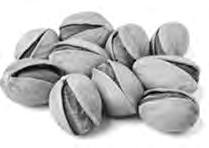
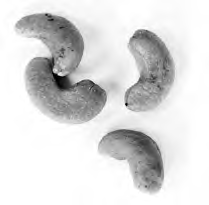
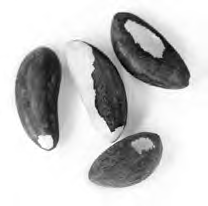
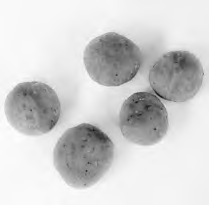
Perk #69: I Could Finally Admit I Believe in Angels and Fairies
285
Macadamia
Serving size: 11 nuts
●
calories: 204
Notoriously hard to shell and expensive, but oh so exotic and
tasty.
Special fact:
Macadamia nuts are high in thiamine, which
helps keep your nervous system healthy. They also make us
think of Hawaii, and that feels nice.
Pistachios
Serving size: 49 nuts
●
calories: 162
Pistachios are related to the mango.
Special fact:
Pistachios are rich in lutein, an antioxidant for
healthy vision and skin. They also have as much potassium as
a small banana (287 mg). Notice that natural pistachios are
beige, not red. The red dye added after harvest that turns your
fingers a pretty shade of pink is used to hide imperfections.
(And I always thought they grew on pink trees.)
Cashews
Serving size: 18 nuts
●
calories: 163
One of the favorites to eat on their own.
Special fact:
You can get 10 percent of your daily RDA of
iron in one serving of cashews. They are also a great source of
folate (a cancer fighter) and vitamin K (which helps blood to
clot normally and is vital for normal vitamin D absorption).
Brazil Nuts
Serving size: 6 nuts
●
calories: 186
Brazil nut trees can live 500 years!
Special fact:
One Brazil nut contains more than the required
daily allowance for selenium. Selenium is the subject of many
studies that suggest it can prevent cancers. While it is essential for
thyroid health, too much selenium can cause hair loss (yikes!),
so limit your servings to one and don’t eat Brazil nuts every day.
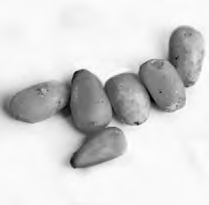
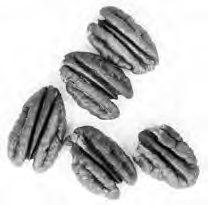
286
100 Perks of Having Cancer
Pecans
Serving size: 19 halves
●
calories: 196
There’s more to pecans than PIE.
Special fact:
Pecans are rich in beta-sitosterol, a type of
plant sterol found to lower cholesterol and aid in prostate
health as well as fight cancer. They’re healthy no matter how
you say them—PEE-cans or pi-CONS.
Pine Nuts
Serving size: 1/4 cup
●
calories: 228
The smallest of the nuts is big on nutrition.
Special fact:
Pine nuts are high in manganese, a mineral
that helps metabolize carbs and proteins and also increases hor-
mones that help you to feel full, which makes it a great “weight-
loss nut.” They are also high in iron (3 milligrams per serving).
Pine nuts are soft when raw but have a wonderful flavor when toasted.
Place on an oven-safe pan and bake for 15 to 20 minutes in a 350°F oven,
stirring every 10 minutes. Pine nuts are great for adding creaminess to
shakes.
Notice I didn’t include peanuts in this list of nuts because peanuts are
technically not nuts at all. They are part of the legume family, as in beans,
and while they aren’t unhealthy, they don’t rate high enough in nutrition
(in my snooty opinion) to belong to the special nut family. If you like
peanut butter, try almond butter, which packs a bit more nutrition (fiber
and calcium) and tastes just as good with grape jelly. Here are some tips
when making your nut selection.
